Why I am voting "Yes" to the BHP Group DLC demerger
For those who had an actual holiday, you may have missed the market chatter about how to vote on next week's shareholder resolution concerning the proposed unwind of the complex, and difficult to understand BHP Group Dual Listed Company (DLC) structure.
Difference of opinion is what makes a market, and so you will (rightly) hear different opinions voiced about whether you should vote your shares "YES" to unwind the DLC, and bring all of the BHP Group shares outstanding, in one class, back home to the ASX.
The alternative is the status quo, of two non-fungible share classes, that cannot be exchanged one for the other, but which are joined at the hip by the DLC merger agreement.
There is a lot to parse here, and some arguments of different kinds.
Some are manifestly emotive:
The London register benefits so we should vote "NO"!
If you feel that way, then by all means vote that way.
However, I hope to persuade those who are undecided that the better course of action is to vote with BHP Group management, and to say "YES" to unwind the complex structure.
There has been money made to date, mostly by offshore investors, who were able to profit by trading the two legs of this de-merger arbitrage via the common currency US listings. As I will soon demonstrate, there is very little left in that trade, perhaps 2%. That train has well and truly left the station, and one would profit very little to get on board of it.
The question thus centers on the future of BHP Group, and not the past.
The emotional factor detailed above: "we were wronged" because some traders made money on betting that the demerger will complete is much discussed among Australian investors. However, in truth, any Australian domiciled investor could well have done that trade.
It is true that many Australian funds managers do not operate with a global perspective and so have limited themselves, and their investors, to only take positions in ASX listed securities.
They may feel themselves wronged, but this is a global financial market we operate in.
The header image I chose is the horrified figure of journalist W. W. Beauchamp witnessing the climactic final saloon shootout in Clint Eastwood's Noir Western The Unforgiven (1992).
There is no character in this movie whom you would take home to meet Mum. They are all bad, in their own way, and on one life mission only: survival with revenge on the side.
This is not an exact metaphor for arbitrage trading but is perhaps apropos of the emotions.
The appropriate set of emotions is well illustrated by this famous piece of movie dialogue:
Little Bill Daggett: You just shot an unarmed man.
Bill Munny: He should have armed himself...
The appropriate level of emotional involvement in a gunfight is zero. Empathy is a handicap.
Similarly, when discussing the demerger of two pieces of the exact same financial opportunity, our register of emotional investment is just that: zero. Whether I feel good or bad that some folks in London saw their shares rise does not impact my point of view one iota.
As I maintained some months ago, in my wire "Where's Iron Ore headed from here?", there was a splendid opportunity in BHP Group shares, for those investors restricted to the ASX, when the market panicked about China and trashed the stock. Emotions ruled high then, and doubtless led many investors to unsound decisions. It was a buying opportunity.
The BHP Group ASX listed securities are up strongly since the September 2021 lows, but we now have the looming shareholder resolution as to whether to approve the demerger.
The stance we take is straightforward: this is a job for fundamental analysis.
Ordinarily, this is a difficult job. Fundamental analysts are faced with the heinously difficult task of estimating future earnings, discount rates, market conditions and so on.
As we shall soon see, none of this is relevant to a decision on the BHP Group DLC structure.
There is no forecasting required whatsoever.
In any future scenario, BHP Group is worth more demerged than together.
The simple fact is that both shares, the London and Australian one, pay the exact same dividend per share, that is struck in USD, and paid to the respective shareholders in their own currency. Absent tax distortions, two absolutely identical dividend streams are worth exactly the same value per share.
The reason for this peculiar situation has to with the oddity of a DLC merger.
These are technical questions, but rather simple once they are understood for what they are. Unlike the more common situation, where a dual listed company has some of its shares that trade in other markets (think of New Zealand stocks like Xero (ASX: XRO) or A2 Milk (ASX: A2M) ), the shares of DLC merger partners are strictly non-fungible. This means that you cannot, without having broken the DLC agreement, exchange one share for the other on a 1 to 1 basis.
The normal mechanisms of inter-market arbitrage do not work for DLC companies. They almost never trade at the theoretical par value.
Whereas Xero on the New Zealand stock exchange, with due adjustment for the Australian and New Zealand exchange rates, will trade in close parity with its Australian listed share, this has not been the case for BHP Group PLC and BHP Group Limited since their original merger.
That is because, strictly speaking, which means legally speaking, the shares are in different and distinct companies. They are not legally shares in the same company. Investors do not treat them as being "worth" the same in active trading on the two stock exchanges. This is due to tax and clientele effects in the two different marketplaces, in spite of a legal agreement to equalize the dividend payout per share, as measured in a common currency.
You might be forgiven for thinking that this is simply because the two shares are in different markets, and trade in different currencies. However, since the inception of the DLC merger between BHP Limited and Billiton PLC, the two shares have been cross-listed in the USA. While the share ratios were set so that the US shares each pay the exact same dividend, where this dividend is announced, and paid, in US Dollars, they have rarely traded at the same value.
For convenience, here is a chart of the two separate US American Depositary Receipt (ADR) securities, as they have traded in the US markets since the inception of the DLC merger.
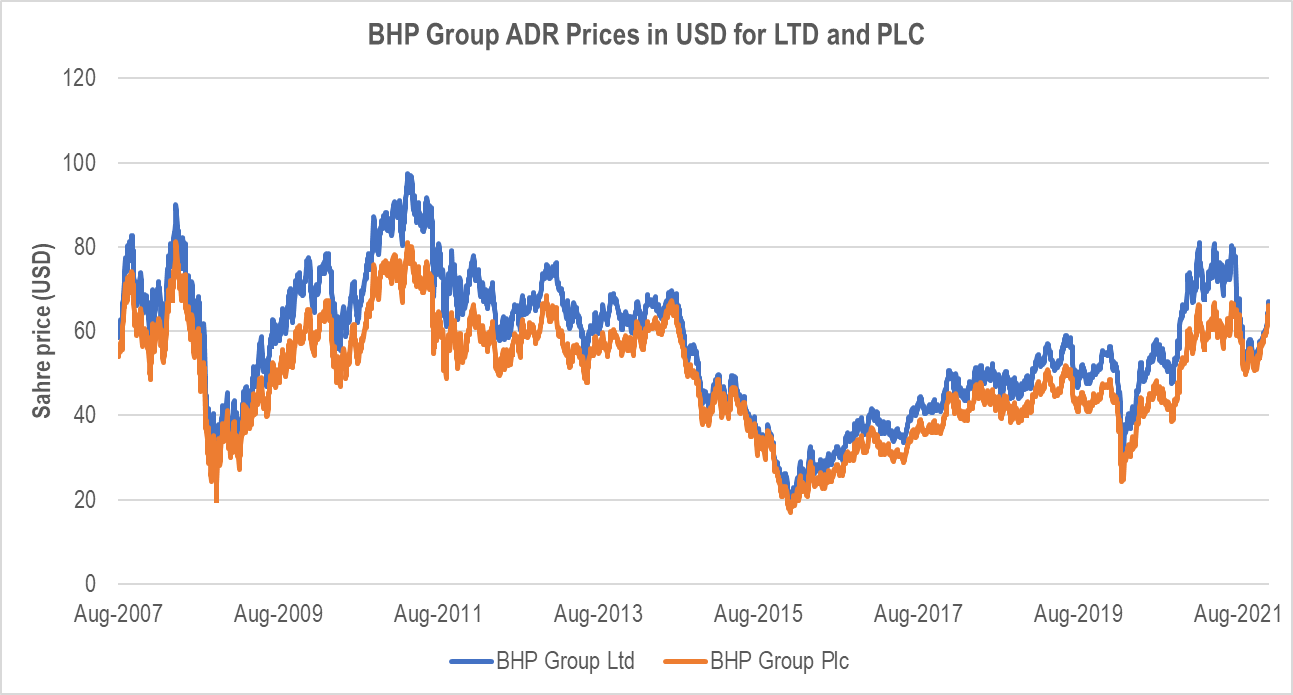
This is a very convenient way to analyze the spread since it matches what a smart arbitrageur would actually do. There is easy stock borrow for both legs in the deep US markets. You, me, or anybody with a US dollar account, can happily go long and short, every day, forever and a day.
You, me, anybody with the eyes to see it, can tell they rarely traded at the same value. The simple way to see how wide or narrowly they traded around "par" value (equality per share) is to just plot the ratio of the two share prices in a common currency (an old hedge fund desk trick).
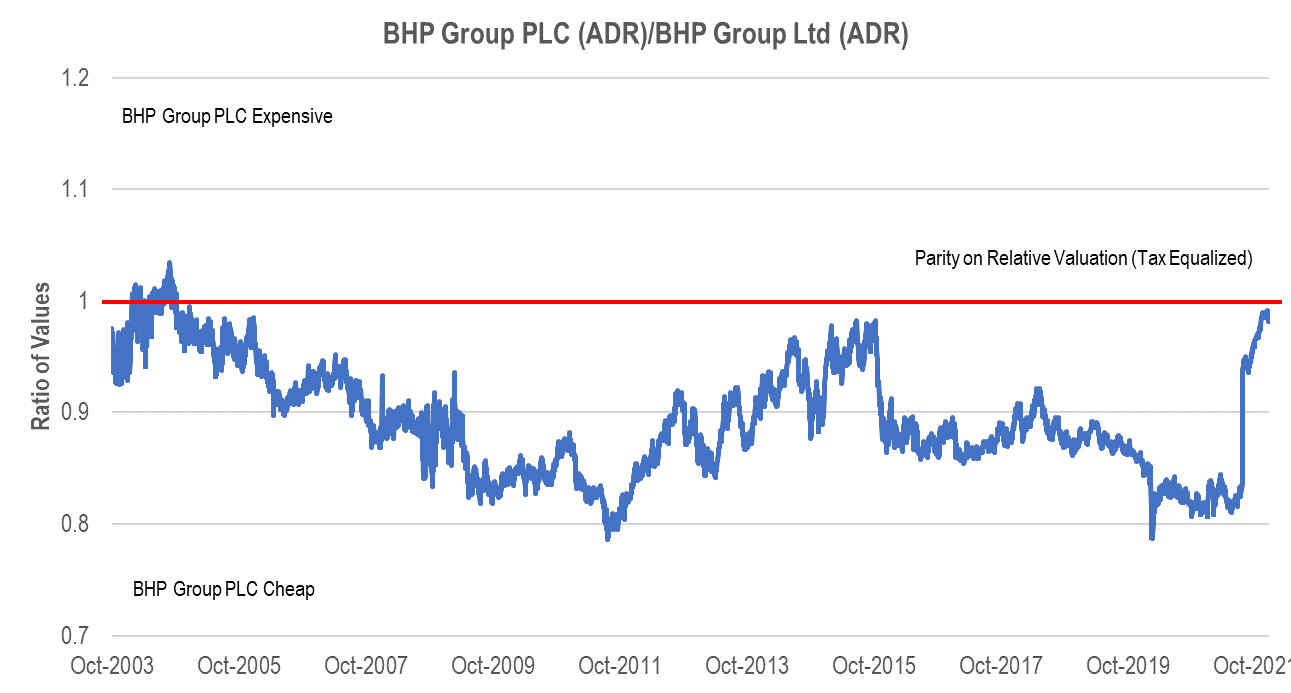
Evidently, the two legs of the current BHP Group DLC structure have not, until the recent move to break the DLC agreement by shareholder approval, traded at the same value. Today, there is a small premium of around 2% in favor of BHP Group Ltd over BHP Group PLC. The market is now of the view that the two shares are worth the same, because they soon will be the same.
The solution to the obvious conundrum as to why this happens is pretty simple.
Presently, BHP Group Ltd and BHP Group PLC are NOT the same legal entity.
There are only very limited means permitted to BHP Group management to adjust shares outstanding in the two pieces to equalize any valuation disparity.
In hedge fund terms, the historical arbitrage opportunity was a weak statistical arbitrage.
If you went long the cheap share and short the expensive share there would be many days, and sometimes weeks, months, or years where you actually lost money. If you look at the above chart, you can see that anybody who was consistently long PLC and short LTD would have lost money consistently from roughly 2004 to 2011, and again, from 2015 to mid 2021.
In contrast, since the announcement of the intention of BHP Group management to seek shareholder approval, in both markets, to dissolve the DLC agreement the strategy of going short the expensive share and long the cheap share have consistently made good money. You can see from the same chart that the rise is near vertical from a 20% discount to near parity.
This should not be surprising. Should shareholders in both the London and Australian listed securities vote the break up the DLC structure and revert all shares to one class that has its primary listing in Australia, the two shares will become fungible, and trade at parity.
This is technical language so let me spell it out:
Two share classes that currently are worth the same, but do not trade at the same value, will soon become one share class that trades in two places, are worth the same, and actually trade at the same value.
That is it, I am afraid. It is actually quite simple.
No doubt your head is spinning.
If shareholders are better off with just one share class, however it is listed, then why was the structure created in the first place? If we have this thing that was originally created by the management of Billiton PLC and BHP Limited, so as to merge their operations, then why did investors vote for it then and, if they did that, then why would they vote to break it now?
That is a question properly put to the investment banking community, but I can answer it after my own reading of events, because I was there, as an analyst, when it actually happened.
The argument for the DLC was that it would reduce the tax impost on respective shareholder groups to complete the merger. Rather than have one company acquire the other, they would simply mint a legal agreement that, whatever happened, they would split the profits of the combined operations in a fixed ratio. This is a Clayton's merger:
Dual Listed Company (DLC) mergers are the mergers you have when not having a merger. The investment banker gets paid regardless.
Companies can make all kinds of joint ventures, revenue and profit sharing agreements, and this is just a super-agreement of this kind that is legally binding between two companies.
You might think: "Why bother? Why not just do a proper merger?"
I did then, and wrote a series of research notes (about five to be exact) when I worked for the Sydney offices of investment bank Credit Suisse First Boston. These were released into the Australian market some twenty years ago. You cannot get them now, so I will save you the trauma of reading them, and, absent that, the pain of wondering what was in them.
Long ago, in March 2001, I looked at previous examples of DLC mergers, such as Royal Dutch Shell (the London and Netherlands listings) and the publisher Reed PLC and Elsevier NV (the London and Netherlands listings). This was in the lead up to the creation of the BHP DLC.
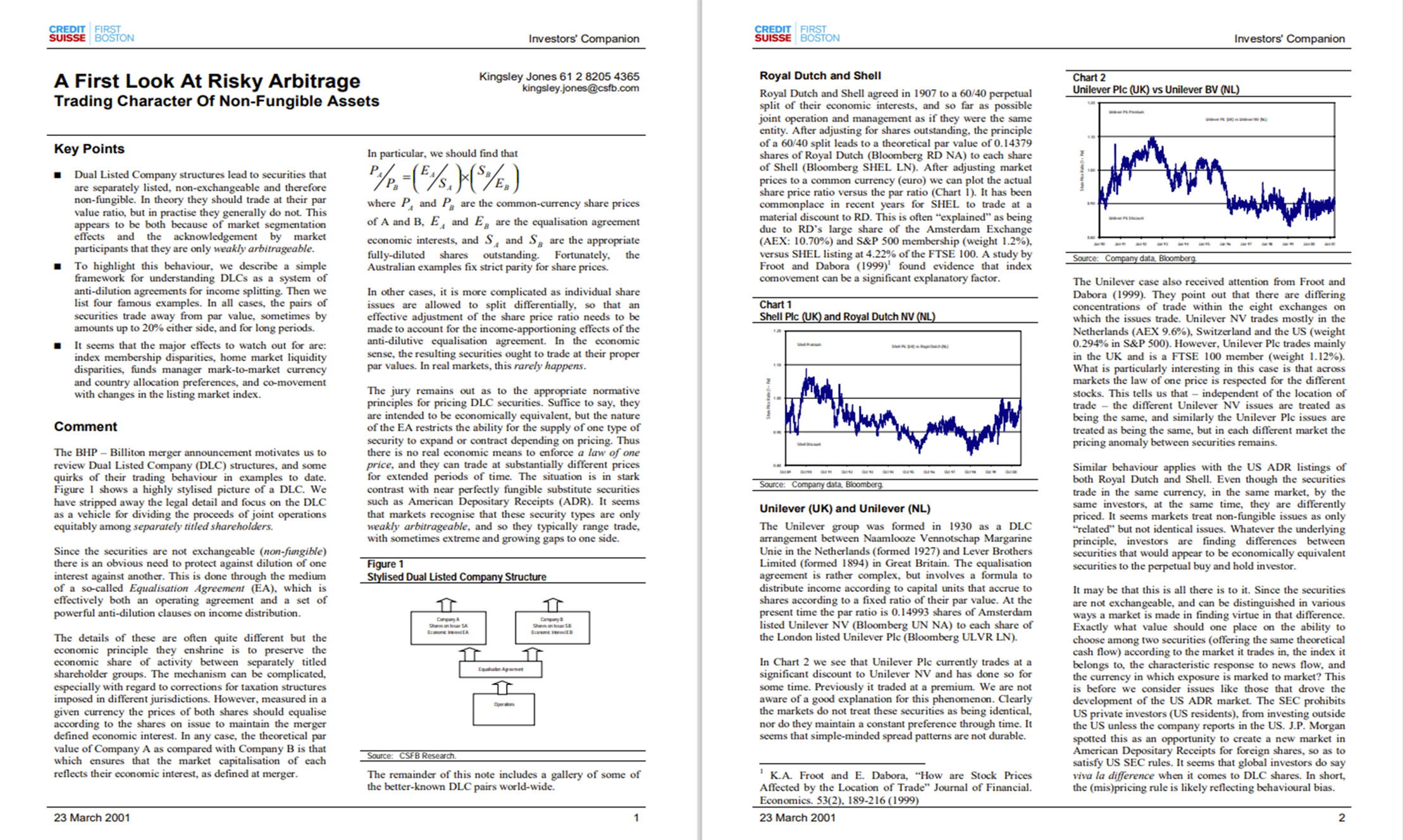
The then BHP analyst Peter O'Connor asked me to look at the historical trading behavior of previous Dual Listed Company (DLC) structures since there was much debate in the market. What I observed then, as a matter of historical fact, was that the two halves of DLC entities almost never traded at their theoretical par value.
Armed with this knowledge of history, I took the heroic view that the same weak arbitrage trading dynamic would apply to the BHP DLC, the Brambles DLC, and the Rio Tinto DLC. Needless to say, history has borne me out. People did disagree with me, but, so what?
What I forecast then is precisely how the trading scenario has played out, over twenty years.
The time when DLC partners trade consistently at parity is when, and only when, the DLC structure is broken up.
I am not the only analyst to have mounted this argument.
Elliott Management, the activist hedge fund in New York, mounted the case for the structural demerger that BHP Group will now put to shareholders. The original argument was mounted in a well-researched piece that they commissioned from a third party. The original document is no longer public, but I managed to download it from Wayback Machine at this url.
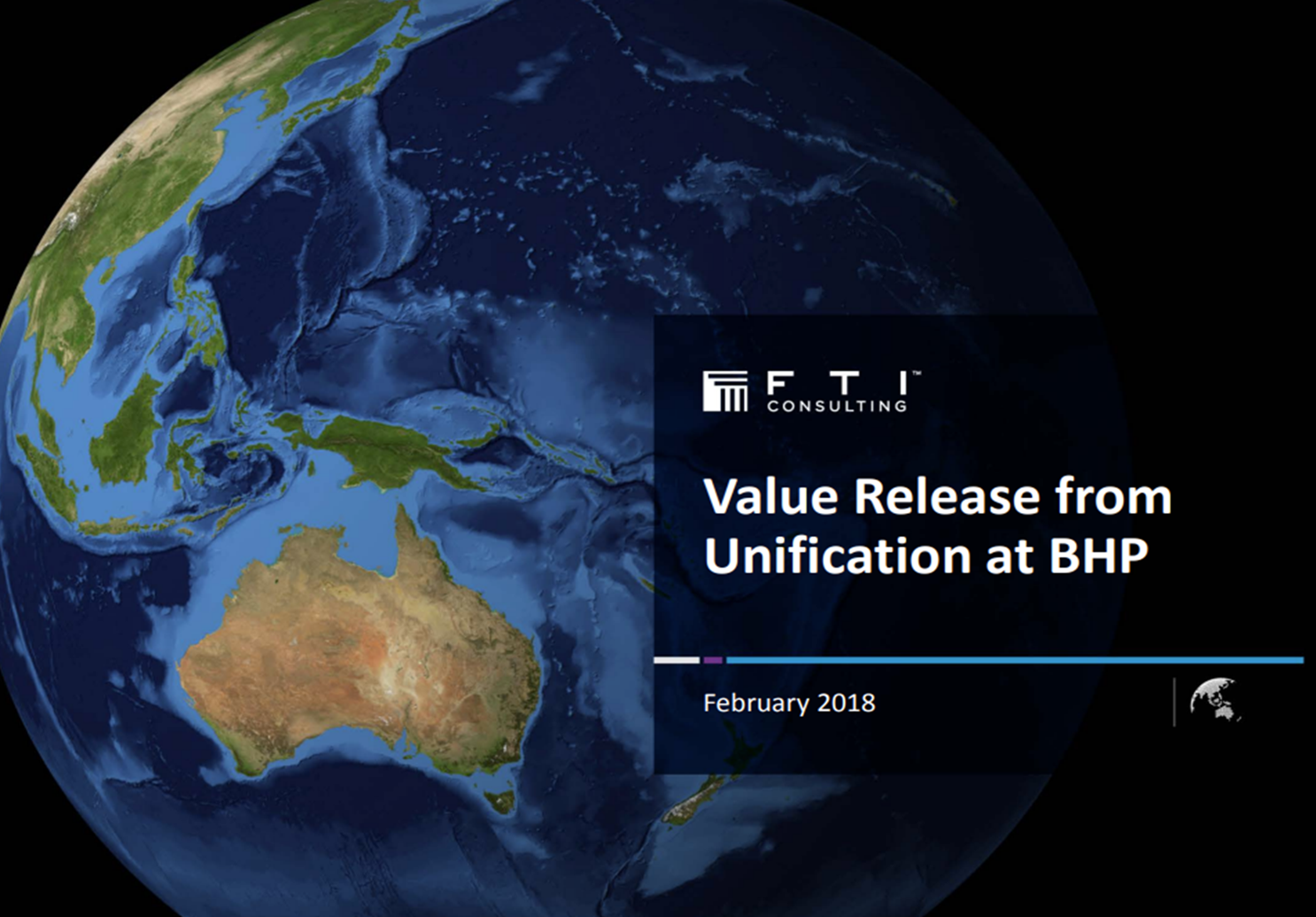
Enough of the ancient history.
Now that the market is driving the relative value of the two pieces of BHP Group towards parity, why should we vote "YES" and look for a further uplift in value?
This argument is once more of a fundamental nature, and pretty simple.
Under the former status quo arrangement, BHP Group could build up franking credits for distribution to shareholders, but the DLC merger agreement requires a strict policy in the apportioning of value, in a fixed ratio, between BHP Group Ltd and BHP Group PLC.
As Elliot Management was at pains to point out, this means that the franking credits that are reserved as a "slice of value" for the BHP Group PLC piece go unused. They are just wasted. Franking credits only have value when distributed to Australian domiciled shareholders.
Any dividends paid to BHP Group PLC shareholders, which are struck at exactly the same USD per share value as the BHP Group Ltd shares, simply go wasted from a franking credit view.
This means that the after tax yield on BHP Group PLC shares is less in the hands of London shareholders than it is for BHP Group Ltd shareholders in Australia.
If the tax values of two common dividend streams are different it is natural that the entity, as a whole, has a higher combined value when dividends are sent to those who value them most highly.
Due to actions of the Australian Taxation Office (ATO), it is not legally possible for any financial intermediary to stream the value of lost franking credits out of the hands of London register shareholders and into the hungry hands of Australian retirees who can use them.
Allow me to blunt and unemotional in my voting appraisal.
The clients of Jevons Global are Australian retirees. As my clients, I speak to them. What they told me they want is a higher and more reliable stream of fully franked dividends. I listened.
When I look, objectively, and unemotionally, at the decision before my investors, I can only, in all honesty, make one single and unequivocally clear voting recommendation.
Vote "YES" to the BHP Group DLC demerger because the result will be the release of what are presently lost franking credit balances for the purpose of paying a larger aggregate dividend into the hands of Australian shareholders.
I know that my clients are successful in life, or they would not have amassed the quantum of investible funds that they have. I know that they are rational, because they regularly check any decision of mine they believe to be irrational. I know that they love fully franked dividends.
To this, I add one well-worn piece of market wisdom for any trading gunslinger to be:
Once the BHP Group register is consolidated in Australia, on the ASX, the S&P ASX 200 index weight of the stock is likely to rise from 6% to around 10%.
For this reason, my clients took my advice to set their holdings in BHP Group Ltd shares within the portfolio at around 10%. We rode out the manic sell-off that occurred last year, and used the dividend cash to top up holdings more cheaply. Our clients are positioned for what we think will be a rational "YES" vote at next week's meeting, followed by manic index buying.
Certainly, as I indicated, arbitrageurs have made some money on the short-term closing up of the relative value spread between BHP Group Ltd and BHP Group PLC. However, Australian long term investors will see a reinvigorated BHP Group, that is once more back home, pays the full value of its franked dividend stream into Australian hands, and is well set to profit from the management team direction into future facing metals. Furthermore, if you eyeball my first chart, you can see that both PLC and LTD have gone UP in value since September 2021.
In short, The Big Australian is back and we are fully on board that ore train.
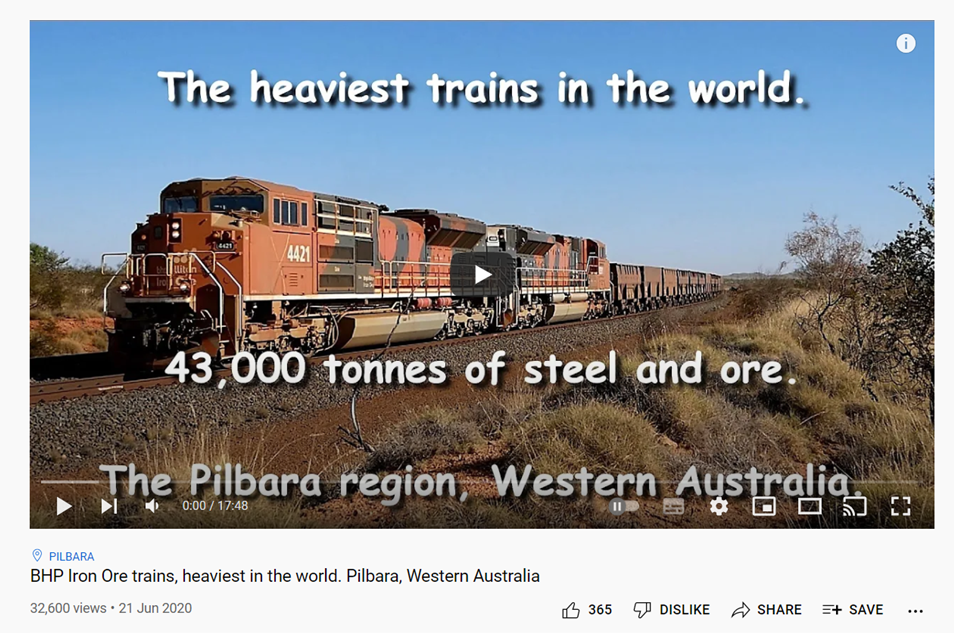
Don't be that index funds manager standing in front of 43,000 tonnes of freight train.
Toot Toot!
If some London shareholders got a welcome 10% pop I do not begrudge them that. London has been doing it tough with omicron, so good luck to our fellow investors in the Old Dart.
To paraphrase an old, politically incorrect, but apropos advertisement of old:
The man from Jevons Global, he say YES!
These are good bananas!
Get some and let The Unforgiven wagon train of arbitrageurs roll on to their next gunfight.
Never miss an insight
Enjoy this wire? Hit the ‘like’ button to let us know. Stay up to date with my content by hitting the ‘follow’ button below and you’ll be notified every time I post a wire. Not already a Livewire member? Sign up today to get free access to investment ideas and strategies from Australia’s leading investors.
(Image Credit: The Unforgiven (1992), Directed by Clint Eastwood)
3 topics
3 stocks mentioned

